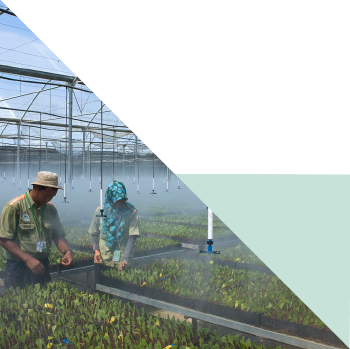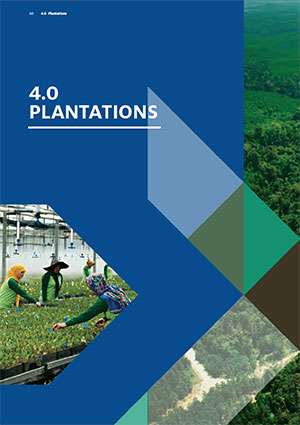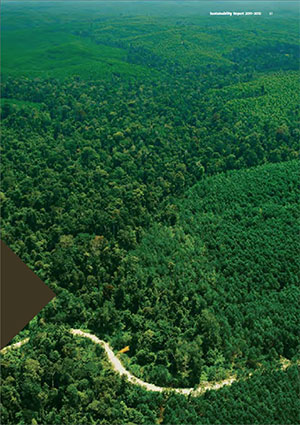Growing global demand for plantation fibre
The United Nations has estimated that the world’s population will be at least 9 billion people by 2050. The World Business Council for Sustainable Development (WBCSD) has estimated that the total yield and harvest from planted forests will need to increase threefold, with the area under fibre plantations needing to grow by 60% versus 2011 to meet expected demand for fibre in 2050.
Plantation establishment undertaken now will ensure a sustainable and renewable source of fibre to meet future global demand.
Due to the faster growth cycle of acacia species in tropical climates, the volume of wood that can be harvested per hectare is very high compared to northern latitudes. In Indonesia, acacia rotation times are five to six years, a considerably shorter time than for northern latitude plantation species.
Various countries around the world, including Indonesia, are legitimately capitalising on these trends as part of their economic development agenda.
Forestry - a key driver of Indonesia’s development
Indonesia has emerged from decades of sporadic growth to become a positive economic story in recent years. With 238 million people, more than half of whom are under 40 years-old, growth and opportunity must continue to deliver a viable future for Indonesians.
Poverty however remains endemic, particularly in rural areas. Despite a strong improvement in the number of people rising out of poverty, almost 30 million people still live below the poverty line in Indonesia.
Production forestry is important to the livelihoods of more than 20 million Indonesians and is estimated to generate 1.8 million jobs. In Riau Province, where APRIL has its primary operations, forestry contributed 16.9% of the Province’s GDP in 2012.
Balancing development with environmental protection
In September 2011, Susilo Bambang Yudhoyono, Indonesia’s President stated: “Sustainable development is part of our efforts to boost Indonesia’s economy so that it will become the 12th largest economy by 2024... We therefore need to go into partnership with all stakeholders to sustainably manage our forest resources.”
Unsanctioned human encroachment and illegal logging in forest areas has, over recent decades, led to a reduction in the areas of undisturbed forest remaining in Indonesia, although deforestation of pristine forest areas has slowed considerably in the past five to ten years.
In addition, the Government has made international commitments to ensure development is undertaken responsibly, particularly in relation to climate change, carbon emissions and environmental sustainability.
Indonesian Pulp & Paper Industry Context
Indonesia has 131 million hectares designated by the government as forest areas.
Of that, 78 million hectares has been zoned for production forestry. Land earmarked for pulp and paper activity accounts for approximately 10.5 million hectares of production forest areas, or 8% of total forest areas in Indonesia.
Of that 10.5 million hectares, approximately half (5.25 million hectares) has been licensed to pulp and paper commercial interests through formal concession licenses, representing 4% of total forest areas.
The government requires that the maximum area of any pulp and paper concession that can be used for plantations is +/-70% (APRIL and supply partners only use 51% of their concession areas for plantations).
That means the total area currently licensed and identified for plantation establishment accounts for approximately 2.8% of total forest areas in Indonesia. APRIL’s own concessions account for approximately 0.15% of all forest areas in Indonesia.
Responsible forest management is a challenge in Indonesia. The forest areas are vast and often remote. Poverty and lack of economic alternatives drive illegal forest activities that have no regard for regulation or conservation. International scrutiny of Indonesian forestry practices often ignores the fact that without responsible private sector management, significant areas of forest are lost to illegal logging, slashand- burn farming and destructive human encroachment.
By contrast, APRIL’s responsible forest management ensures sensitive areas of forest are conserved, land use is optimized and local communities share the benefits of development.
APRIL’s responsible forest management ensures sensitive areas of forest are conserved, land use is optimized and local communities share the benefits of development.


